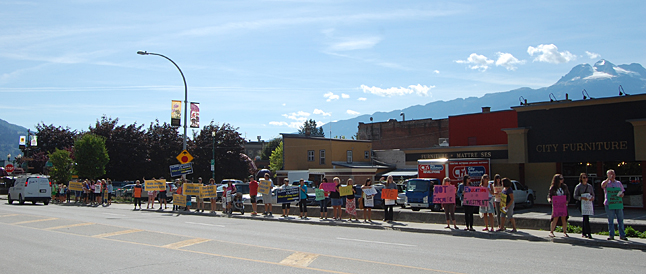
By David F. Rooney
Local teachers protested along Victoria Road at noon on Friday, September 5, eliciting numerous honks and waves of support from passing motorists. The teachers have been locked out and on strike since June and hope a BC Teachers’ Federation call for binding arbitration will bear fruit.
Binding arbitration was proposed by BC Teachers’ Federation President Jim Iker on Friday but received only a lukewarm response from Education Minister Peter Fassbender.
Arbitration is a quasi-judicial process through which labour disputes between management and labour, regarding the collective agreement, are resolved. An impartial third-party (an arbitrator or arbitration board) hears evidence presented by both the union and the employer on the issues in dispute, and hands down a decision which becomes a binding arbitration agreement. Please click here to learn more about arbitration in Canada.
According to CBC News quoted Fassbender said the government is “not prepared to say to someone else, ‘Well you make our decisions for us.’ I think the reality is that I’ve never been a fan of binding arbitration. I don’t think anyone in the labour relations field feels that that is a vehicle that really serves the interests of all parties.”
He said he hadn’t yet seen any details or the teachers union’s proposed preconditions for arbitration and until he does, he won’t make any “categorical statements” about whether the government will go for it.
“Until we see some details, it’s very difficult for me to comment beyond that,” he said.
Teachers, however, are in favour of it.
“I support binding arbitration because it might help bring more funding into public education,” said RSS teacher Jeff Wilson as he walked with his placard.
Like the dozens of other educators who waved at passersby on Friday, Wilson is anxious to return to the classroom. “We need to do whatever is possible [to reach an agreement],” he said.
Like the dozens of other educators who waved at passersby on Friday, Wilson is anxious to return to the classroom. “We need to do whatever is possible “to reach an agreement),” he said.
Wilson also noted that MLA Norm Macdonald’s column in support of teachers could not have come at a better time. The strike is stressing all teachers financially and some are looking at teaching jobs in the Yukon and elsewhere so hearing a supportive voice was truly welcomed by all teachers.
RSS math teacher Lida Carey echoed her colleague.
“I think it’s the best way to end the impasse,” she said. “I like to think they’ll go for it.”
That could well happen. The longer this strike drags on and the more the BC Liberals are perceived as being the ones perpetuating the strike the less patience the public will have with the government.



